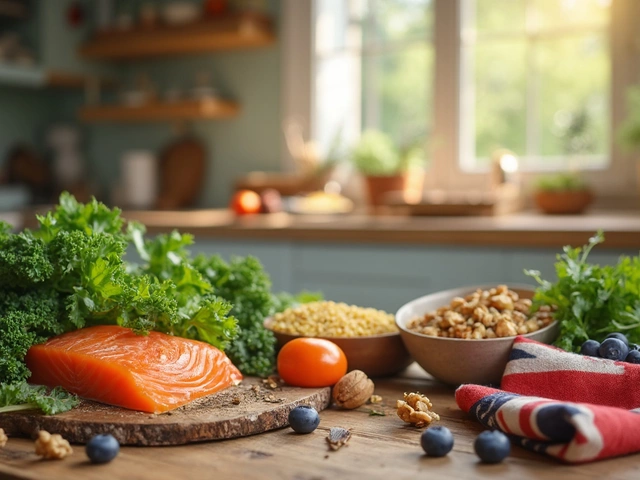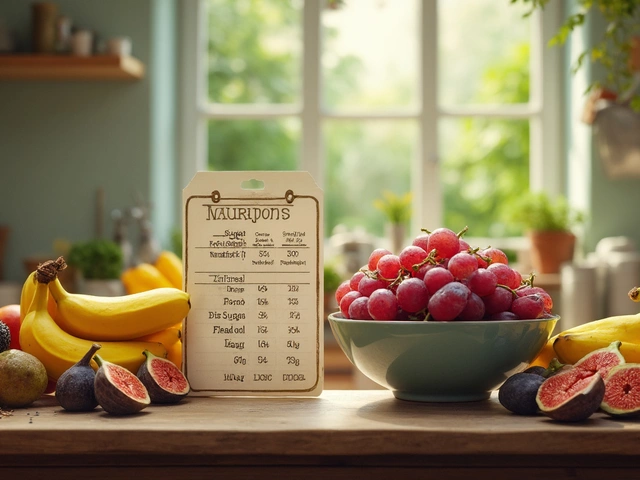
The decision to embrace a vegan lifestyle often comes with a mix of enthusiasm and questions, one of the most common being: will I gain weight? It's an interesting topic, as shifting to a plant-based diet involves numerous changes in eating habits and food sources. Many assume that since it cuts out meat and dairy, weight loss would be automatic.
However, the truth is more nuanced. A vegan diet isn't inherently a weight-loss plan. Some may find the number on their scale increasing, depending on individual food choices and lifestyle factors. It's not just about what you eat, but also how you eat. Understanding the nutritional dynamics of vegan foods is crucial for anyone looking to manage their weight on a plant-based diet.
In this exploration, we'll uncover common myths associated with vegan weight gain, highlight the role of calorie intake and nutrient balance, and emphasize the influence of processed vegan foods. Plus, we'll share practical tips for maintaining a healthy weight, paired with some delicious vegan recipes to keep your palate delighted and your health in check.
- The Myths of Vegan Weight Gain
- Calories and Nutrient Balance
- Impact of Vegan Processed Foods
- Importance of Whole Foods
- Practical Tips for Weight Management
- Delicious Vegan Recipes for Health
The Myths of Vegan Weight Gain
There are a lot of myths floating around when it comes to weight gain on a vegan diet. Some folks believe that cutting out animal products entirely should naturally lead to shedding pounds, while others are convinced that the high-carb nature of many plant-based foods is a sure path to putting on weight. It's easy to get lost in the confusion when everyone seems to have an opinion. But understanding what's myth and what's grounded in truth requires unraveling the complexities of plant-based nutrition.
First, let's address a common misconception: going vegan automatically equals weight loss. This isn't always the case. While many plant-based foods are lower in calories, it matters greatly what you're consuming. A diet heavy in processed vegan foods can easily be calorie-dense. Foods like vegan ice creams, cookies, or even certain meat substitutes can be surprisingly high in fats and sugars. They might not contain animal products, but they can still lead to weight gain if not consumed mindfully.
On the opposite end of the spectrum, some critics claim that a vegan diet is deficient in key nutrients, causing the body to crave more and overeat as a result. However, a well-planned vegan diet can provide all the necessary nutrients, sometimes even more than a traditional omnivore diet. The trick is making informed food choices, emphasizing whole foods over processed ones, and ensuring a balanced intake of proteins, healthy fats, and carbohydrates.
There was a time when eating vegan was more difficult, with limited options leading to dietary compromises. But now, with the spread of vegan recipes and the availability of a wide array of plant food options, nutritionally balanced meals are easier than ever to prepare. The key is to include a variety of fruits, vegetables, grains, and legumes, which offer essential vitamins and minerals without the excess calories. It's not about calorie counting but about nurturing a harmonious relationship with food.
Still, many worry about protein intake. A diet devoid of meat might seem lacking, but the world of plant-based proteins is vast. Foods like lentils, chickpeas, tofu, and quinoa are excellent sources of protein, each bringing its own nutritional benefits. Integrating such elements into a daily meal plan disproves the idea that vegan means lower nutrient intake. Indeed, cultures across the globe have sustained themselves primarily on plant-based diets for centuries.
One study published by the journal 'Nutrients' noted, "A balanced vegan diet can not only provide adequate nutrition but often results in lower body mass index without effortful dietary restriction."
"Eating a variety of plant foods ensures a complete diet," the study emphasizes, showcasing that knowledge and diversity in diet are crucial. Rather than eliminating foods, consider expanding your choice of ingredients, making room for nutrient-rich surprises that enrich the plate and the body alike.To sum up, the belief that a vegan diet leads to weight gain is tied more to myths and misinformation than to reality. Understanding the balance of foods, focusing on nutritional density, and embracing the diversity in a vegan diet allows individuals to manage their weight healthily while enjoying a compassionate lifestyle.
Calories and Nutrient Balance
Understanding how calories work in a vegan diet is essential for managing weight effectively. When you remove animal products from your meals, you open up a world of plant-based deliciousness, but it's vital to ensure you're getting enough calories to sustain your energy needs. The caloric content of plant foods can differ dramatically from that of meats and dairy, often being less calorie-dense. This implies that while you're eating a large plate of salad, legumes, and grains, you might not be ingesting as many calories as you think. This can be an advantage or a drawback, depending on your goals.
It's crucial to maintain a balance between calorie intake and nutrient-rich choices. Simply put, calories measure the energy food provides, while nutrients ensure your body's optimal functioning. A shortfall in either can lead to adverse effects. For instance, while avocados, nuts, and seeds are energy-rich, they also boast essential fatty acids that play critical roles in heart health. Including a variety of these nutrient-dense foods ensures you aren't missing out on any vital components.
One often unnoticed factor is the role of protein in weight management. Many worry about protein deficiency when going vegan, yet if the diet is carefully constructed, it shouldn't be an issue. Foods like lentils, chickpeas, tofu, and tempeh are packed with protein and can rival, if not surpass, some animal sources. According to a study from the Journal of the Academy of Nutrition and Dietetics, when properly planned, plant-based diets provide adequate nutrition for all stages of life, including athletes relying on higher protein intake.
"A well-planned vegan diet can meet all nutrient needs. It also contains health-promoting properties," notes Dr. Joanne Slavin, a respected nutrition expert.
If you're watching your weight, consider paying attention to meal volume. Plant meals can be very filling due to their fiber content, often making you feel satiated with fewer calories. This is beneficial for those aiming to lose weight. On the other hand, individuals looking to maintain or gain weight may need to include more calorie-dense options like sweet potatoes and whole grains.
| Food | Calories per 100g |
|---|---|
| Avocado | 160 |
| Chickpeas | 164 |
| Tofu | 76 |
Maintaining nutrient balance on a vegan diet requires some planning but becomes second nature once you understand the array of available foods. Health stores often provide nutritional guides that can serve as handy references to ensure you're not unknowingly under or over-consuming any major nutrient group. Remember, a plant-based nutrition journey is just as much about discovery as it is about balance. Explore, experiment, and you'll find that staying healthy and energetically sustained is easily manageable while living a vegan lifestyle.

Impact of Vegan Processed Foods
While adopting a vegan diet may seem straightforward due to its emphasis on plant-based consumption, not all vegan foods are inherently healthy or conducive to weight management. This distinction becomes particularly prominent when we look closely at the rise and influence of vegan processed foods. These products range from plant-based burgers and sausages to vegan sweets and cheese alternatives. While convenient, vegan processed items can be misleadingly marketed as healthy, yet they may contain high levels of sodium, sugars, and unhealthy fats, contributing to weight gain if consumed in excess. Understanding these dynamics is critical for those aiming to maintain a healthy lifestyle while indulging in vegan alternatives.
One of the main issues with vegan processed foods is the presence of calorie-dense and nutrient-poor substitutes. These foods often rely on refined grains, unhealthy oils, and artificial ingredients to mimic the taste and texture of non-vegan counterparts. It's easy to consume more calories than anticipated because they might not be as filling or nutritious as whole foods. Relying heavily on these processed options can lead to a lack of essential nutrients, affecting both physical health and weight goals. A diet abundant in these products may see an unexpected uptick in the scale despite an initial expectation of weight loss.
Moreover, there is a psychological aspect to considering processed vegan foods. Many might fall into the trap of assuming that anything vegan is healthy, so they consume larger portions or indulge more frequently. Over time, these habits might have a significant impact on one's energy balance and weight outcomes. Dr. Frank Hu, a nutrition expert from Harvard T.H. Chan School of Public Health, once noted,
"Just because a food is labeled vegan doesn't automatically mean it's a health food. Consumers should be wary of processed vegan foods, some of which might not be significantly healthier than their non-vegan processed counterparts."
A strategic approach when navigating vegan processed foods involves checking ingredient labels and nutritional facts. Being mindful of added sugars, sodium content, and types of fat can make a substantial difference. Opting for products with simpler ingredient lists and fewer additives is generally a wiser choice. Incorporating more whole, plant-based foods like fruits, vegetables, legumes, and whole grains can counterbalance the occasional processed indulgence. Balancing processed food intake with fresh produce ensures better nutrient intake and supports overall health, making weight management more effective as part of a vegan lifestyle. This conscious consumption can prevent the common pitfalls associated with the overreliance on vegan processed foods.
A market's growth in vegan products doesn't just reflect consumer demand; it also highlights the need for more awareness and education around making healthier choices within a vegan framework. A look into various substitutes and their ingredients can aid consumers in selecting their plant-based alternatives wisely. Those invested in maintaining a healthy weight should prioritize cooking at home using whole ingredients or seek out minimally processed options when convenience is necessary. Such adjustments can significantly impact long-term health results, helping individuals enjoy the benefits of a vegan diet without unwarranted weight gain.
Importance of Whole Foods
When discussing the impact of a vegan diet on weight, the role of whole foods cannot be underestimated. Eating these types of foods is a cornerstone of maintaining health and achieving balance within a plant-based nutrition lifestyle. Whole foods, which are minimally processed and as close to their natural state as possible, are rich in essential nutrients and fiber that support optimal body function and can aid in weight management. Unlike their processed counterparts, these foods haven't lost valuable nutrients through refinement. Consuming foods like fresh fruits, vegetables, whole grains, nuts, and seeds provides your body with complex carbohydrates and healthy fats, ensuring energy and satisfaction throughout the day.
Choosing whole foods over processed options helps regulate appetite naturally. They are often bulkier and take longer to digest, providing a slower, more sustained release of glucose into the blood. This aspect is crucial because it helps reduce cravings and keeps you full longer. Studies have shown that diets high in whole foods can lower the risk of obesity, as well as various chronic diseases such as type 2 diabetes and cardiovascular disease. A diet focused on whole foods ensures an adequate intake of antioxidants, vitamins, and minerals that support a healthy metabolism and promote weight stability.
"Eating a diet rich in whole foods is one of the most impactful changes you can make to improve your health," says Dr. Michael Greger, renowned physician and nutrition expert.
Another significant advantage of whole foods is their effect on energy levels and physical performance. By incorporating a variety of nutrient-dense whole foods, individuals can experience organic boosts in energy, aiding in maintaining an active lifestyle essential for weight control. These foods are devoid of artificial additives and preservatives that often contribute to lethargy. Additionally, the natural fiber content in whole plant foods is vital for digestive health. Fiber supports a healthy gut microbiome, which plays a crucial role in weight management by influencing how we digest food and store fat.
Here's a brief overview of some popular categories and examples of whole foods to consider:
- Fruits: Berries, apples, bananas, and oranges. Packed with vitamins, minerals, and antioxidants.
- Vegetables: Leafy greens, broccoli, carrots, and bell peppers are rich in nutrients and low in calories.
- Whole Grains: Quinoa, brown rice, oats, and barley provide energy-boosting carbohydrates and fiber.
- Legumes: Beans, lentils, and chickpeas offer plant-based protein and complex carbs.
- Nuts and Seeds: Almonds, chia seeds, and flaxseeds supply healthy fats and proteins.
Incorporating a variety of these foods into daily meals can greatly contribute to a balanced diet. By emphasizing whole foods and making mindful choices, one can effectively harness the benefits of a vegan diet, not only addressing weight management concerns but also enhancing overall health and well-being.

Practical Tips for Weight Management
Navigating a vegan diet while aiming to maintain or lose weight can be both rewarding and challenging. The success lies in understanding not just the quantities of what you consume, but the quality. It's easy to get carried away with vegan substitutes that can sometimes pack more calories and less nutritional punch than their non-vegan counterparts. That's why sticking to whole, unprocessed foods is often more beneficial.
Start by planning your meals. A well-structured menu not only keeps temptations at bay but ensures you're hitting your nutritional goals. Incorporate a diverse range of vegetables, legumes, and grains. These foods are rich in fiber, which aids in digestion and helps you feel full longer. For instance, quinoa and chickpeas are excellent sources of protein and can keep you satiated. Try to include them in salads or stews, making your meals both nutritious and filling.
Calories can add up quickly with nuts and seeds, despite their health benefits. It's essential to consume them in moderation. Mindful snacking on raw almonds or sunflower seeds is far healthier than munching on highly processed snacks. That said, don't shy away from healthy fats found in avocados or olive oil—they are essential for maintaining cell structure and function. Portion control, however, remains key. Another effective strategy is to start your meals with a bowl of soup or a hearty salad. This practice can help curtail overeating by curbing appetite before diving into the main course.
Remember, hydration plays a significant role too. Often we mistake thirst for hunger, leading to unnecessary snacking. Keep a water bottle handy, and actively ensure you're meeting your daily water intake. If plain water doesn't excite you, try adding slices of lemon or mint for a refreshing twist.
Staying Active
Equally important is integrating physical activity into your routine. A well-balanced plant-based nutrition plan should be complemented by movement. Whether it's yoga, jogging, or a brisk walk in the park, regular exercise boosts metabolism and enhances mood. The endorphins released during physical exertion can further assist in weight management by reducing stress-induced cravings.
"A balanced vegan diet, paired with regular exercise, can achieve and maintain a healthy weight effortlessly," notes Dr. Sarah Gerhardt, a renowned nutritionist.
Lastly, assess your eating patterns. Many find success in keeping a food diary. Documenting what you eat makes you more aware of what and why you're consuming certain foods, identifying potential pitfalls in your diet. While sometimes challenging, the effort pays off when combined with the joy of exploring new vegan recipes that keep your taste buds engaged and your body nourished.
With these mindful practices and an emphasis on healthy recipes, you can not only maintain but embrace a sustainable and joyous vegan lifestyle without the unwanted pounds. Remember, it's all about balance and making informed choices that best support your health and well-being.
Delicious Vegan Recipes for Health
Embarking on a vegan diet doesn't mean sacrificing pleasure and flavor. In fact, it opens up a landscape of vibrant colors, textures, and tastes. A key part of maintaining health and avoiding weight gain as a vegan lies in discovering and consistently enjoying vegan recipes that are as satisfying as they are nourishing. Among the stars of plant-based cuisine are dishes that focus on whole foods, like grains, vegetables, legumes, and nuts, balancing nutrition and taste.
A great place to start is with breakfast. Try a hearty quinoa bowl. Quinoa, rich in protein and fiber, provides a solid foundation that keeps your energy levels stable throughout the morning. Mix this supergrain with fresh fruits, like berries or bananas, and a splash of almond milk, then sprinkle with a handful of nutrient-dense seeds such as chia or flax. This combination isn't just delicious; it's packed with antioxidants and omega-3 fatty acids, known for supporting heart health.
For lunch, consider a chickpea salad sandwich. Chickpeas offer an impressive amount of protein and are a staple in the vegan diet. Mash them with vegan mayo, dill pickles, celery, and a hint of mustard for a creamy, tangy filling that's perfect between slices of whole grain bread. Pair with a side of mixed greens, and you've got a meal that’s both satisfying and refreshing, ideal for midday nourishment.
"Transitioning to a vegan diet doesn't mean you're giving up your favorite dishes," says plant-based chef, Ella Mills, who encourages experimenting with spices and herbs to bring dishes to life.
In the evening, a comforting lentil stew becomes a centerpiece meal. Lentils are a powerhouse of nutrition, high in protein, and can be seasoned in many ways to suit any palate. Cooked slowly with tomatoes, cumin, coriander, and a touch of chili powder, and served with a side of brown rice or quinoa, this stew provides warmth and comfort. Not only is it filling, but it also contributes important nutrients vital for a balanced plant-based nutrition.
Creating these meals in your kitchen may inspire a newfound love for cooking. The variety of fresh, colorful ingredients fills your environment with creativity and vitality. This exploration into flavors and textures is pivotal not just for your adventurous taste buds, but significantly for maintaining long-term interest in a plant-based lifestyle. To make it even more exciting, we can add some data that illustrates the potential health benefits of these ingredients:
| Ingredient | Benefit |
|---|---|
| Quinoa | Rich in essential amino acids |
| Chickpeas | High in fiber for digestive health |
| Lentils | Excellent source of iron |
Finally, indulging your sweet tooth doesn't have to lead to compromise. Whip up some bliss balls mixing dates, cacao, and nuts in a food processor, rolling the mixture into small balls. These little treats are free from refined sugar, but full of flavor and energy-providing nutrients.
Keeping your vegan diet colorful and varied, filled with whole foods and home-cooked meals not only keeps your health in check but can also be a delightful adventure every day. These recipes and their nutritious potential show that eating vegan is not just a choice, but a joyful expression of love for yourself and the planet.





